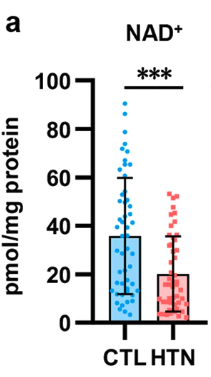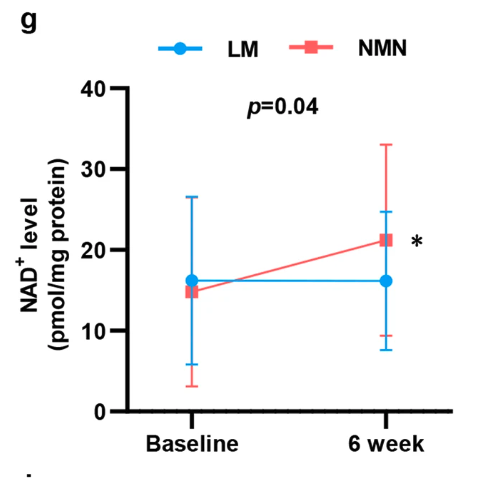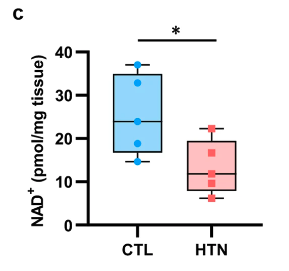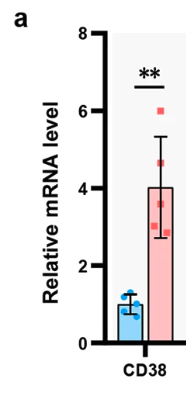This randomized control trial evaluated the effect of NMN supplementation on cardiovascular function in individuals with high blood pressure.
“Our results showed a beneficial effect of NMN on BP and vascular function.”
Key Points
This study revealed important insights into NAD+ levels and NMN supplementation in people with high blood pressure:
- Low NAD+ levels in the blood were associated with high blood pressure
- NMN reduced blood pressure and ameliorated vascular dysfunction
- People with high blood pressure had lower levels of NAD+ in their main blood vessel (aorta)
- CD38, a molecule that breaks down NAD+, was elevated in the main blood vessel of people with high blood pressure
Clinical Trial Evaluated NAD+ Levels and NMN Supplementation in Patients with High Blood Pressure
Assessment of NAD+ Levels in Hypertension (high blood pressure):
- NAD+ levels in a specific type of white blood cell called peripheral blood mononuclear cells (PBMCs) were measured in a group of healthy individuals (n=52) and another group of individuals with high blood pressure (n=50).
NMN Intervention Study:
- A subset of patients with high blood pressure were selected and randomly divided into two groups:
- NMN group (n = 9): received 800 mg NMN once daily and made lifestyle modifications
- Lifestyle modification group (n = 10): made lifestyle modifications only
- Both groups were instructed to follow a lifestyle modification protocol:
- Intake 1400–1600 kcal/day: 54% carbohydrates, 24% proteins, 22% lipids, 108 mg cholesterol, 35 g fiber; at a low-salt diet ( < 6 g per day), avoid smoking and alcohol consumption; performing aerobic activity 4 days per week such as 45 min on a stationary bicycle
- Researchers performing specimen collection and data analysis were blinded to the treatment condition
All experiments involving tissue from the human aorta (the large blood vessel that carries blood from the heart) were approved by the Ethics Committee and followed the proper guidelines.
Patients with High Blood Pressure had Low NAD+ Levels
NAD+ levels decreased by 44% in blood cells (PBMCs) from patients with hypertension (high blood pressure).

The figure on the left illustrates individuals with hypertension (HTN, red bar) had significantly lower levels of NAD+ in their blood cells (PBMCs) compared to healthy patients (CTL, blue bar).
The researchers also found that lower levels of NAD+ were associated with poor blood vessel function.
“These results suggested that decreased NAD+ levels may be involved in the modulation of hypertension and vascular dysfunction.”
NMN Supplementation Enhanced Effects of Lifestyle Modifications on NAD+ Levels and Blood Pressure
Combining NMN supplementation with lifestyle modifications resulted in a more significant increase in NAD+ levels within blood cells (PBMCs) compared to the group that solely focused on lifestyle modifications.

At the start of the study (baseline), both groups had similar NAD+ levels. After six weeks, the NMN + lifestyle modification group (red line) showed a 43% increase in NAD+ levels, whereas no significant changes were seen in the group that made lifestyle modifications without supplementation (blue line).
“Collectively, these findings showed that NMN supplement effectively improved NAD+ metabolism in hypertensive patients.”
NMN Reduced Blood Pressure and Ameliorated Vascular Dysfunction
“NAD+ boosting therapy with nicotinamide mononucleotide (NMN) supplement reduced BP and ameliorated vascular dysfunction in hypertensive patients.”
The NMN + lifestyle modification group had a more significant improvement in blood pressure and vascular function compared to the group that only made lifestyle modifications.
“NMN supplement for 6 weeks reduced SBP and DBP by 6.11 mmHg and 3.56 mmHg.”
NAD+ Levels in the Major Blood Vessel of Patients with High Blood Pressure were Reduced
The researchers then aimed to determine if changes in NAD+ levels within the main blood vessel wall were related to blood pressure regulation and blood vessel function.
“Although NAD+ levels declined in PBMCs in hypertensive patients, whether the change in NAD+ in the arterial wall directly participated in the regulation of BP and vascular function should be further investigated”

NAD+ levels in the main blood vessel (aorta) of hypertensive subjects were reduced by 47.7%.
This is depicted in the figure on the left. The NAD+ levels in the main blood vessel of patients with high blood pressure (red box) are lower compared to those in the main blood vessel of healthy patients (blue box).
CD38, a Molecule that Breaks Down NAD+, was Elevated in the Major Blood Vessel of Patients with High Blood Pressure
Balancing the production and breakdown of NAD+ is crucial for maintaining healthy NAD+ levels.

The levels of CD38, a molecule known to break down NAD+, in the major blood vessel of patients with high blood pressure are depicted in the figure.
You can see CD38 was much higher in the major blood vessel of patients with high blood pressure (shown in red) compared to healthy patients (shown in blue).
Conclusion
This study confirmed previous reports that showed people with high blood pressure had lower blood levels of NAD+. Supplementing with NMN, a precursor to NAD+, restored NAD+ levels and improved blood pressure and vascular function
The levels of NAD+ were also lower in the major blood vessel of people with high blood pressure. A possible explanation for this decline was an elevation in the levels of CD38, a molecule that breaks down NAD+.
“Overall, the present study may shed new light on novel strategies in which NAD+ boosting therapy, including NMN supplement and CD38 inhibition, may turn out to be a promising therapeutic measure to treat patients with hypertension.”
